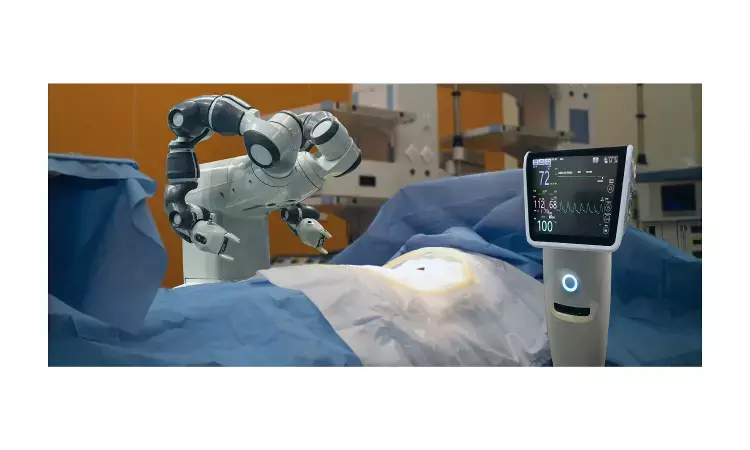- Home
- Medical news & Guidelines
- Anesthesiology
- Cardiology and CTVS
- Critical Care
- Dentistry
- Dermatology
- Diabetes and Endocrinology
- ENT
- Gastroenterology
- Medicine
- Nephrology
- Neurology
- Obstretics-Gynaecology
- Oncology
- Ophthalmology
- Orthopaedics
- Pediatrics-Neonatology
- Psychiatry
- Pulmonology
- Radiology
- Surgery
- Urology
- Laboratory Medicine
- Diet
- Nursing
- Paramedical
- Physiotherapy
- Health news
- Fact Check
- Bone Health Fact Check
- Brain Health Fact Check
- Cancer Related Fact Check
- Child Care Fact Check
- Dental and oral health fact check
- Diabetes and metabolic health fact check
- Diet and Nutrition Fact Check
- Eye and ENT Care Fact Check
- Fitness fact check
- Gut health fact check
- Heart health fact check
- Kidney health fact check
- Medical education fact check
- Men's health fact check
- Respiratory fact check
- Skin and hair care fact check
- Vaccine and Immunization fact check
- Women's health fact check
- AYUSH
- State News
- Andaman and Nicobar Islands
- Andhra Pradesh
- Arunachal Pradesh
- Assam
- Bihar
- Chandigarh
- Chattisgarh
- Dadra and Nagar Haveli
- Daman and Diu
- Delhi
- Goa
- Gujarat
- Haryana
- Himachal Pradesh
- Jammu & Kashmir
- Jharkhand
- Karnataka
- Kerala
- Ladakh
- Lakshadweep
- Madhya Pradesh
- Maharashtra
- Manipur
- Meghalaya
- Mizoram
- Nagaland
- Odisha
- Puducherry
- Punjab
- Rajasthan
- Sikkim
- Tamil Nadu
- Telangana
- Tripura
- Uttar Pradesh
- Uttrakhand
- West Bengal
- Medical Education
- Industry
Antibiotic-irrigating wound protector lowers complications after radical cystectomy with urinary diversion: Study

A new study by Albert H Kim and the team revealed that antibiotic-irrigating wound protector (AWP) is effective in reducing infectious complications following radical cystectomy with urinary diversion (RCUD). Since it's a preliminary study, further investigation is needed on its safety. However researchers add that the findings are a significant step towards decreasing morbidity of complicated procedures. The findings of the study are published in the journal Urology.
An estimation of 81,400 new bladder cancer was reported which was 4.5% of all new cancer diagnoses in the year 2020. Radical cystectomy with urinary diversion and bilateral pelvic lymph node dissection is the gold standard protocol for patients with muscle-invasive or high-risk non-muscle-invasive bladder cancer, however, robotic surgeries are recently used popularly and are proven much successful.
The objective of the study was to determine whether the use of AWP reduces infectious complications after robotic RCUD.
The study was a prospectively maintained bladder cancer database was suspected for patients undergoing robotic RCUD at a tertiary referral center one year prior to implementing an AWP and one year after (2018–2020). All diversions were performed extra-corporally. 92 patients total. 46 consecutive patients using a traditional wound protector (TWP) and 46 consecutive with an AWP. Infections were classified as symptomatic urinary tract infection, blood stream infection, and surgical site infection. The incidence of infectious complications at 30- and 90-days were compared.
The results of the study were
• Baseline patient characteristics between the 2 groups showed no statistically significant differences.
• The overall complication rate was 65.2% in the TWP group and 26.1% in the AWP group at 30-days, and 67.4% vs 30.4% at 90-days.
• Focusing on infections, the 30-day complication rate was 30.4% in the TWP group compared to 6.5% in the AWP group.
• This pattern persisted at 90-days with 37.0% in the TWP group compared to 6.5% in the AWP group.
• Most complications were symptomatic UTI and blood stream infections, 14/24 (58%), requiring parenteral antibiotic treatment.
Kim and team concluded that "We provide preliminary data showing use of an AWP can reduce infectious complications after RCUD. While larger prospective studies are warranted, our findings are a significant step towards decreasing morbidity of an already highly morbid procedure."
Reference:
Medical Dialogues consists of a team of passionate medical/scientific writers, led by doctors and healthcare researchers. Our team efforts to bring you updated and timely news about the important happenings of the medical and healthcare sector. Our editorial team can be reached at editorial@medicaldialogues.in.
Dr Kamal Kant Kohli-MBBS, DTCD- a chest specialist with more than 30 years of practice and a flair for writing clinical articles, Dr Kamal Kant Kohli joined Medical Dialogues as a Chief Editor of Medical News. Besides writing articles, as an editor, he proofreads and verifies all the medical content published on Medical Dialogues including those coming from journals, studies,medical conferences,guidelines etc. Email: drkohli@medicaldialogues.in. Contact no. 011-43720751


